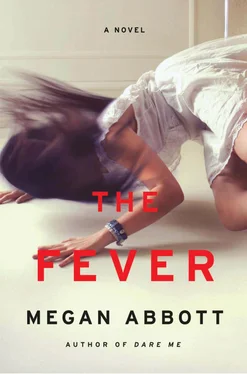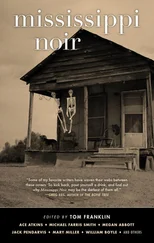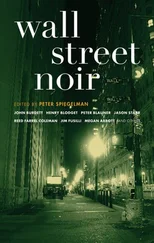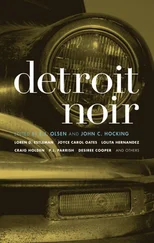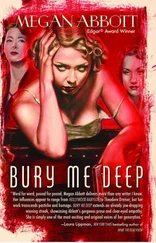The music was so bleak and he’d been trying not to listen, but when he saw Gabby on the stage, and she looked so focused, so intent, he was impressed.
Most times when he skated he felt like that, like there was no one else on the ice.
The only sound, the puck clinking on the post, thunking against the boards.
He would fix his eyes like hers were fixed. He would look toward the net with such intensity nothing could stop him from getting what he wanted.
* * *
Tom wasn’t sure of the moment Gabby’s neck started to dip back because at first it felt like part of the performance, her knotted brow, her hand vibrating on the slender fingerboard, everything.
It started with her chin, then her whole jaw.
He watched as Gabby’s face started to tremble, and then, the way the light hit, it was like her face itself was bending.
Her chair skidded loudly, her neck thrown back so far that, in the darkness, it looked like her head had disappeared. For one terrifying instant, gone.
The cello still tight between her clenched legs, she lifted herself upright again, her face flushed.
Mr. Timmins had dropped his baton and was moving toward her, and Tom saw Deenie jump to her feet in the front row.
* * *
It’s the same thing, Deenie thought, feeling herself rise, it’s happening again. It’s the same thing, the same time, the same everything.
She felt her legs hurtle up the steps, the stage lights hot on her.
Her dad seemed to be behind her in an instant, hands on her shoulders.
Mr. Timmins was leaning over Gabby, still in her chair, her legs twisted around its legs, its rubber feet clacking on the stage floor.
She was holding on to the cello and smiling oddly.
“I’m sorry,” she said, her face like a flame. “I’m sorry.”
* * *
Tom had one hand on his daughter as the other band members, instruments in hand, were closing in on Gabby.
Gasps, brass clattering on the floor, one girl tripping over herself, nearly teetering off the foot of the stage.
“Back everyone,” Tom said, arms out. “Stand back.”
Without thinking, he pushed Deenie back too.
Somewhere, a camera flashed, then another. Girls with their phones tucked in their long velvet skirts.
“Stop that!” shouted Mr. Timmins.
“Gabby, honey,” Tom said, leaning down in front of her. “Are you okay?”
There was something like a film over her eyes, like she might be about to cry.
Then her neck seemed to jolt back with such force he expected to hear a pop, her body surrendering to thunderous motion, every limb shuddering and her torso slumping to the right.
He and Mr. Timmins gripped her, locking her between their arms, Mr. Timmins trying to take the cello from her.
“I’m okay,” she said, dropping the cello at last, hand over her mouth.
“Dad,” Tom heard a voice behind him say. “Dad.”
Standing in the back, Eli had been the one who’d called 911.
Four minutes later, the back doors flew open and he showed the paramedics where to go.
“Oh, man,” the taller one said, rubbing his winter-red face. “Another one?”
Onstage, Mr. Timmins was kneeling over Gabby, who was looking up at him, her hands around her own neck like she was trying to hold it straight.
All of them had their hands over their mouths, watching.
“Goddamn it, Jeremy.”
Eli watched as his dad grabbed a phone from one of the boys’ hands.
“I’m sorry,” Gabby kept saying, her voice inexplicably loud, carrying through the space. “Did that just happen? I just got confused. Are we in school?”
The cello kept getting knocked around, wobbling and quaking like it was a live thing.
“Can you breathe, miss?” the paramedic asked.
“What,” Gabby said, her voice high and puzzled. “Yes.”
“Let’s get everyone out of here,” the tall one said, motioning to Mr. Timmins to help. “Clear this area. Give her some room.”
They couldn’t wrest the bow from Gabby’s hand.
Tiptoeing, Deenie kept trying to see over the bear-shouldered the paramedics, who were trying to snap an oxygen mask on Gabby’s face.
“I don’t need to go anywhere,” she was saying, her fingers crooked over the mask, pushing it away. Her eyes landed on Deenie. “Deenie, I don’t .”
“I know,” Deenie said, nodding, her neck thrusting almost as hard as Gabby’s had. It hurt to look at.
“I just felt dizzy or something.”
“But just to be safe,” Deenie said. “Okay, G?”
* * *
Tom sat Deenie down in the car, windows shut tight. He asked her to breathe slowly. He was trying to explain something he couldn’t explain.
“…and as soon as we can reach out to Gabby’s mom, we will. They’ll do some tests. It’s just better if you stay here. With me.”
“Why couldn’t we go to the hospital?” Deenie said. “Gabby wanted me to.”
Tom wasn’t so sure about that. When Lara Bishop arrived, soon after the EMS, Gabby’s embarrassment seemed heavy and tortured. She couldn’t even look her mother in the eye.
“She didn’t faint,” Deenie said. “But her body. What was happening to her body?”
The pensive look on Deenie’s face, like when she was small. Finding a cat drowned in the ditch by the mailbox. He didn’t know how long she’d been staring at it, her brother next to her touching it gently with a stick, hoping to nudge it to life. That night she’d had nightmares, her mouth was filled with mud. He’d tried to explain it to her, how accidents happen but we really are safe. But there was, already, the sense that nothing he said touched what was really bothering her, which was the realization that you can’t stop bad things from happening to other people, other things. And that would be hard forever. He’d never quite gotten used to it himself.
“And what does it all have to do with the health department?” she asked.
“They’re just making sure everything’s okay,” he said.
Of course, he had no idea. When he’d learned about their visit, just before first period, he hadn’t liked the sound of it.
“It was the nurse,” Bill Banasiak told him. “She blew the whistle.”
The new nurse, the peaked blond one whose name Tom could never remember, had called her supervisor at the hospital about a bite on her arm from Lise. Embarrassed, she hadn’t told anyone at first. But now she was worried. What if there was some kind of virus at the school? One of those new kinds?
“Not the sort of talk you want to have at a school,” Banasiak said, shaking his head.
Especially not coming from the nurse, Tom thought.
But he didn’t tell Deenie any of this.
“I’m sure we’ll know more soon,” he said now, realizing he’d said the same thing ten times about Lise. “Okay?”
“Dad,” she said, looking down at his phone resting on the gear panel, “can we call Lise’s mom again?”
“Sure,” he said finally. “I’ll call in a little bit.”
“How about now?” she asked.
“Not right now, okay?”
Deenie nodded tiredly. For a second, she looked very old to him, the rhythmic chin wobble of his own grandmother.
But when she turned back to him, her chin had steadied. Tugging her jacket collar from her neck, she said, “But you will?”
“I will,” he said. Then, “You feel up to class?”
Part of it seemed ridiculous to him, to have his daughter sit and listen to a lecture about the Panama Canal, but he couldn’t think what else to do with her.
For a moment, only a moment, he wished Georgia were there. Georgia, at least the Georgia from before, would have canceled her own appointments, left work, and hijacked Deenie for a soothing schedule of girl time. Or their version of girl time: buying stacks of magazines and tall coffee drinks and curling on the den sofa together. Or something. She seemed to know how to do those things. Until she didn’t.
Читать дальше
